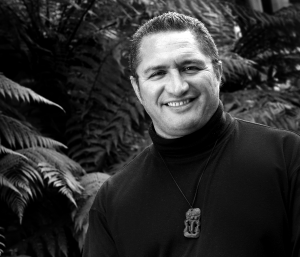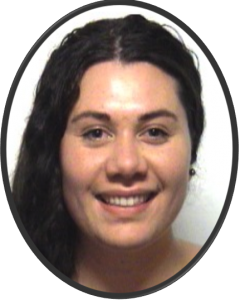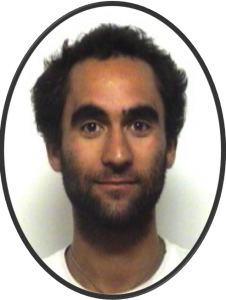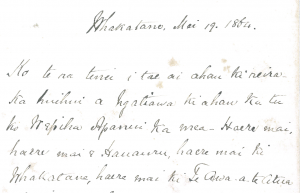“Testing te reo”
Check out Poia Rewi’s research on the revitalization of te reo Māori in this extended article in the latest issue of the Otago Bulletin.
Success at the Ngā Kupu Ora Book Awards
I te Rāmere nei i tū ai Ngā Kupu Ora Book Awards, ā kei Te Hua o Te Reo Māori te wini mō te paraihe Reo. He mea ētita tēnei pukapuka e Ahorangi Rāwinia Higgins (he kaiako ia nō Te Tumu i ngā rā o mua) rātou ko Ahorangi Tuarua Poia Rewi (koia te Tīni o Te Tumu ināianei) ko Vincent Olsen-Reeder.
The Ngā Kupu Ora Book Awards were held on Friday. The Value of the Māori Language: Te Hua o Te Reo Māori, co-edited by former Te Tumu staff member Associate Professor Rāwinia Higgins, current Te Tumu Dean Associate Professor Poia Rewi, and Vincent Olsen-Reeder, took out the Te Reo prize.
He pukapuka tēnei “that aims to engage and reawaken Māori consciousness on the value of Māori language won the Te Reo prize. The Value of the Māori Language: Te Hua o Te Reo Māori draws on research from more than 30 contributors about the value of the Māori language and their aspirations for its future direction.” Click here for more details of the awards.
He mihi nunui ki ngā ētita, ki ngā kaituhi hoki o ngā pukapuka i toa, ā, ki ngā pukapuka katoa e whakatairanga ana i te kaupapa o te mātauranga Māori.
Dr Paringatai as keynote speaker at Tuia Te Ako hui
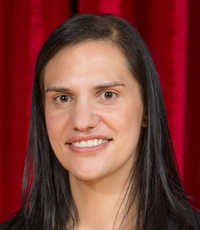 Te Tumu lecturer, Dr Karyn Paringatai, will be giving a keynote address at the Tuia Te Ako hui to be held at at Te Kete Ika, Lincoln University, Lincoln, Canterbury, 8 -10 July 2015. This hui will bring together the diverse Māori tertiary whānau to discuss, debate and challenge current issues relating to Māori success in tertiary education. Karyn, who won the Prime Minister’s Supreme Teaching Award last year, will be talking about her innovative teaching methods of “teaching in the dark”.
Te Tumu lecturer, Dr Karyn Paringatai, will be giving a keynote address at the Tuia Te Ako hui to be held at at Te Kete Ika, Lincoln University, Lincoln, Canterbury, 8 -10 July 2015. This hui will bring together the diverse Māori tertiary whānau to discuss, debate and challenge current issues relating to Māori success in tertiary education. Karyn, who won the Prime Minister’s Supreme Teaching Award last year, will be talking about her innovative teaching methods of “teaching in the dark”.
Click here for biographies of the Keynote Speakers.
Better than Australians?
Nathan Albury suggests that Pākehā have embraced the Māori language better than white Australians have supported their indigenous languages. In an opinion piece for SBS Nathan makes this claims.
But the Australians have done so little to protect their languages, it’s not hard being better than them in this regard. And te reo Māori still needs everyone’s support. Me āwhi tonu te reo Māori, me tautoko, me kōrero.
Nathan is at Oslo University, but is supervised by Te Tumu’s Lyn Carter.
Attitudes of NZ youth to Māori-language revitalization
What do young people think about the future of te reo Māori?
Nathan Albury is undertaking research on “folk linguistics”, that is, what do ordinary people think about language use. Nathan was formerly here at Te Tumu, but is now close to completing his PhD at the University of Oslo on folk linguistics relating to the revitalization of te reo Māori in New Zealand, and the Saami language in Norway. Te Tumu’s Dr Lyn Carter remains as one of his supervisors.
Nathan has recently written a short pamphlet with some of his findings relating to te reo Māori. He has circulated it to government departments and political parties. In particular he has had a good response from Education Minister Hon. Hekia Parata, and from the Green Party. Click on the link to read Nathan’s pamphlet.Tō Tātou Reo
Seminar: The Folk Linguistics of Māori Language Revitalisation
Nathan Albury, PhD student, will be giving a seminar in Te Tumu on 2.30-3.30pm, Tuesday 18 November in R3S10 (3rd floor, Te Tumu). Please note that this is a different day and venue to usual.
Nathan’s paper, The Folk Linguistics of Māori Language Revitalisation, “applies the folk linguistics of language policy in respect to language revitalisation as a policy project. It reports preliminary findings from research that sought to compare what young indigenous and non-indigenous youth in contemporary New Zealand claim to know about language revitalisation as a policy process, what attitudes and beliefs these youth have towards activities and themes aimed at revitalising the Māori language, and how their knowledge and beliefs manifest into folk linguistic performance when these youth are positioned as hypothetical language policy bosses of the New Zealand government.”
For the full abstract click here, or on the “Seminars” page on the left
Māori-language research in Teaching
It is always good when students can use their skills and research to produce a resource to benefit the university. MAOR427 “He Tuhituhinga” is a 400-level Māori history paper that looks at historical Māori-language texts. All the work and discussion is conducted in the Māori language. This year one of their assignments was the translation of a text, selected by Jeanette Wikaira, Kaituhituhi Ratonga Māori at the Hocken Library, was an account by Hauāuru Taipari of Ngāti Maru about a visit to Ngāti Awa and Whakatōhea in 1864. The students divided the text up, and transcribed and translated it. This was then given back to the Hocken Library as an accompanying resource to the original text.
He mea tino pai kia whakamahia e ngā ākonga ō rātou pūmanawa me tā rātou rangahau hei whakaputa mai i te rauemi, hei painga mō te whare wānanga. He pepa hītori, he pepa tau-tuawhā te pepa MAOR427 “He Tuhituhinga” e āta tirohia nei ētahi tuhinga reo-Māori o neherā. E mahia ana ngā mahi katoa i roto i te reo Māori. He mahi whakapākehā tētahi o ngā aromatawai. Nō te tau nei, ka whiriwhiria e Jeanette Wikaira, e te Kaituhituhi Ratonga Māori o te Uare Hākena te tuhinga nei, nā Hauāuru Taipari o Ngāti Maru i tuhi mō tāna haere ki a Ngāti Awa rāua ko Whakatōhea i te tau 1864. Wehewehea ana te tuhinga e ngā ākonga, tuhia ana ngā kupu Māori ki te rorohiko, whakapākehātia ana. Kātahi ēnei ka tukuna atu ki te Uare Hākena hei tākoha, hei rauemi hoki i te taha o ngā kupu ake a te kaituhi.
New book on the value of the Māori Language
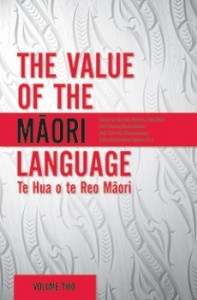 Te Tumu staff member, Associate Professor Poia Rewi and Professor Rāwinia Higgins of Te Kawa a Māui (Victoria University of Wellington) have released an edited collection, The Value of the Māori Language: Te Hua o te Reo Māori, with Huia Publishers. The book features 25 essays from an illustrious field of Māori commentators, responding to the question ‘What is the value of the Māori language?’ more than twenty five years after the passing of the Māori Language Act.
Te Tumu staff member, Associate Professor Poia Rewi and Professor Rāwinia Higgins of Te Kawa a Māui (Victoria University of Wellington) have released an edited collection, The Value of the Māori Language: Te Hua o te Reo Māori, with Huia Publishers. The book features 25 essays from an illustrious field of Māori commentators, responding to the question ‘What is the value of the Māori language?’ more than twenty five years after the passing of the Māori Language Act.
The book was launched recently in Wellington at an event attended by many of the big names of Māori-language education.
This publication is one output emerging from Poia and Rāwinia’s three-year project, Te Kura Reo – Waiora, research funded by Ngā Pae o te Māramatanga.

